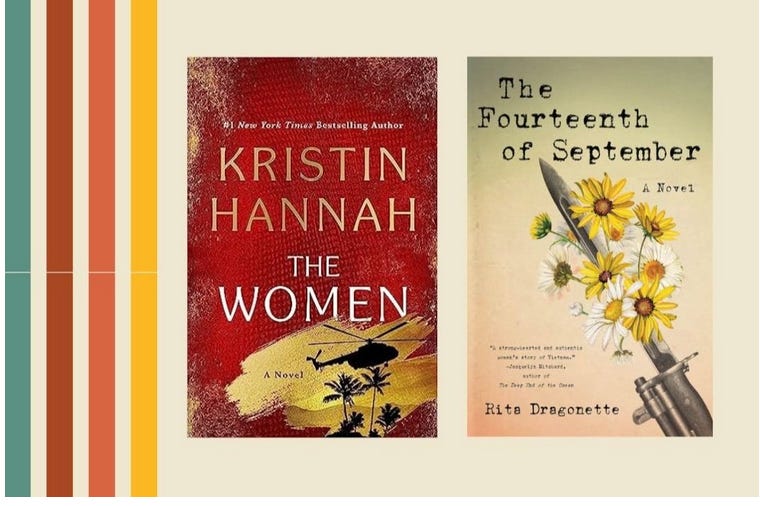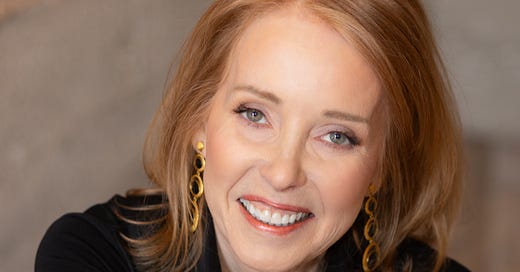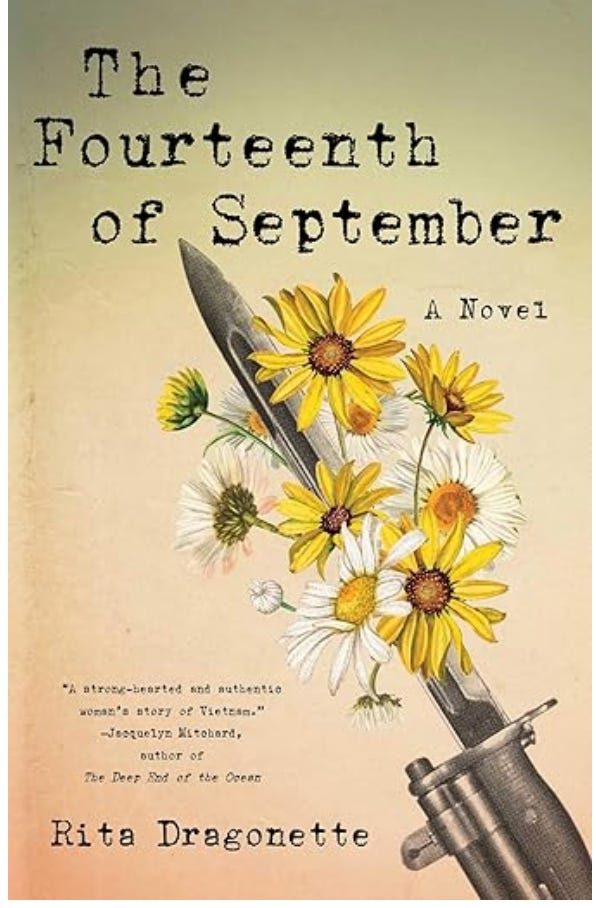Authorship and Book Marketing: Novelist & PR Expert Rita Dragonette
And a celebration of the sixth anniversary of the publication of Rita's debut novel, THE FOURTEENTH OF SEPTEMBER
You’ll find a preview of the September agent list here. This month subscriptions are discounted to $39/yr, $3.90/mo. 📗
Still a few spaces open in the 10-week online short story workshop, "Four Beginnings, One Ending," I’m teaching this fall for Stanford Continuing Studies. Start date is Wednesday, 9/25 (6-8:30 PM PT). Course description & registration details here. You can also drop me a note if you have any questions.
Today’s post features Chicago-based writer and former public relations executive Rita Dragonette. Six years ago tomorrow, September 14, marks the anniversary of the publication of her fittingly titled first novel, The Fourteenth of September. (More on its significance below.) Rita generously shares some of her book promotion knowledge as well as the experience of writing The Fourteenth of September and her recently completed second novel, Last Sunset in San Miguel.
Rita and I were friends and writing colleagues in Chicago before I moved to California in May 2018. She hosted a convivial, intimate send-off for me shortly before my partner and I pointed our cars west and drove to the edge of the contintent, which to my embarrassment, I was late to, having underestimated the time it would take to get to her home in the city via the CTA (Chicago’s stolid but often quirky/sluggish public transportation system) from mine in Evanston (my apologies, Rita!). 😳
Rita is an award-winning novelist and unfailingly supportive of other writers—she’s been a booster of my work as well as the work of many friends we have in common. I hope you’ll find our interview as interesting as I do.
Christine/Bookish: Your first novel, The Fourteenth of September, features a young woman who is at odds with the pro-Vietnam War sentiment that prevails in her family, and her birthday, September 14, was also the first birthday drawn in the real-life draft. Would you share this book's origins? If I remember correctly, it's based on some of your own experiences?
Rita Dragonette: I think it’s probably truer than not when it’s said an author’s first book is about their own experience. In my case, there were big questions that lingered from my experience on campus during Vietnam and in what I came to realize was the character-defining time frame of my generation: the months between the first draft lottery in December 1969 and Kent State in May of 1970.
It was a time when being sent to Vietnam was considered a death sentence, the government determining the destiny of half your classmates by their birthdates, and if you protested, you could be shot. Yes, that sliver of time was dire, and much of modern history has forgotten just how much. It was a story that needed to be told.
At the same time women were often marginalized because their lives weren’t on the line and they “couldn’t possibly understand.” It was a woman’s story that needed to be told.
My objective was to present a dilemma for a female that was as close as possible to the one faced by every male lottery draftee: do I go to Vietnam and probably die for an unjust war or leave everything and go to Canada?
I gave her a fateful birthday—September 14th—which underscored that with a flip of a chromosome she’d be #1 going to Vietnam, and absolutely could understand. And then I gave her grave consequences to weigh. Who is she if she stays in the Army? What is she if she leaves?
Back then I was on a military scholarship myself—one I’d worked exceptionally hard to win, that would (in the parlance of the time) save me from being a secretary. But given the state of the war I had to face a similar decision. I had no intention of using these specifics in the novel until I told my writing instructor I was looking for an example with the same gravitas as my own experience—he told me to use it, that’s what writers do. He gave me the permission I needed.
I must say, when I got the idea to give my character the September 14 birthday, I knew I had the story. I asked several woman how they’d relate to it, and the answer was always some version of a chill down their spine.
CS: You’ve had a very successful career as a public relations executive. How did your knowledge and skills in PR help you market your novel? For an independent press book, it has an impressive number of Goodreads reviews.
RD: Having been a trained marketer was my biggest advantage as a first-time author. Though I’d spent years writing for others, I had nothing under my own name and was starting from scratch with no publishing credentials. But unlike many authors who understandably hate marketing or consider it a necessary evil, I knew it would make all the difference. I pulled out all the stops, using marketing to create “the illusion” I was a successful author until reality caught up.
I leveraged my business and personal networks. I held seven launch events in Chicago alone, and others in cities where I had connections, like the one in L.A. you attended (in the fall of 2018). I hired a publicity firm, ran Facebook ads, and more. I was bold in asking people to read and review and made sure all my materials were as professional as [if I’d written them] for my Fortune 500 clients. I was very proud when a Chicago Tribune writer told me that when he saw my website, he felt fully confident I could sell my book to anyone.
An important key is that I didn’t stop marketing once the launch was over. There are many opportunities, especially online. If I saw something interesting another author did, I tried it for myself. Even now, six years later, I have new interest in the novel because I’m piggybacking on of the success of The Women, by Kristin Hannah, also about a woman nurse during Vietnam.

And even today, if I hear that someone has read my book, I still ask them to write a review, though I’ve learned that to ask them to post on both Amazon and Goodreads is a stretch.
CS: You recently finished a new novel, Last Sunset in San Miguel. What is it about and was the experience of writing it markedly different after the success of The Fourteenth of September?
RD: It’s an homage to Hemingway’s The Sun Also Rises, which is about expats in Paris after WWI—the Lost Generation, wounded and looking for meaning—but also bullfighting, and the fiesta way of life.
I’d always felt the story had similarities to my generation, the roots of which I’d explored in my first novel. My new story takes place in the new expat capital of the world, San Miguel de Allende, Mexico.
It’s about the concept of La Querencia, the place in the ring where the bull feels safe, thinks he’s won and in that moment lives the best part of his life. That last burst of possibility, what will you do with it?
The novel is told by a main character trying to reconstruct her life after a huge betrayal, and the group of others who follow her to San Miguel with their own desperate last dreams, complicating her journey. The tag line for the book says it all: For a generation of dreamers, this last one really must come true.
My first novel took thirteen years to complete, with many stops and starts. This time I wanted to do a short, tight, first-person story and write it methodically, so I’d never be stymied by not knowing what would happen next.
So I started with a detailed plot-plan, a suggestion from the author Jacquelyn Mitchard. This plan, more detailed than an outline, sketched out scenes in sequence and really kept me on track through five years and many revisions. Interestingly, much of the last third of the book, when the action explodes, stayed viable from the initial plan.
CS: The Fourteenth of September received a number of book awards and finalist nods. Would you share with readers the processing of finding and entering your book in these contests?
In this case, it really helped to have professional assistance. My publicist initially asked me which awards I wanted to submit for and I pushed back and asked which she would recommend for my story and target audience. Between us we refined a list that seemed most probable and went from there.
As time went on and other awards were promoted online, I submitted if they were appropriate. This is an ongoing process. For example this year I won two “American Legacy Book Awards” which are specifically for books that have been out for a while.
A very important key for awards (and marketing in general) is to identify your category. While writing The Fourteenth of September I considered it literary fiction, which is a very difficult category. Once I realized that the time frame of my book qualified it as historical fiction, it really took off. Since it’s also about the journey of a woman, it also qualifies as women’s fiction, which also has a huge readership.
CS: What are you working on now, if you don't mind sharing a few words about it?
RD: I’m still refining Last Sunset in San Miguel for submission but have decided that after so many years writing novels, I’d like to spend more time on shorter pieces in a different genre. I started a popular blog (now a newsletter) when I was promoting my first book which got me interested in essays.
I’ve outlined a collection titled Violating the Prime Directive, which, if you remember your early Star Trek, is a rule not to interfere in ways that would alter other cultures.
The title essay is about the state of being childless in the last third of your life. I’ve outlined about five essays that examine the ramifications of being outside the norm, including one that documents when I was run down by a serial killer and would have been his title-defining third victim.
I suppose that after all this fiction (albeit sometimes based on real events), I’m hankering to explore the high drama of reality for a while.






Rita Dagonette s the best! Wonderful interview and insightful look at the writer's life. Thanks for this one, Christine.